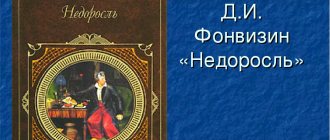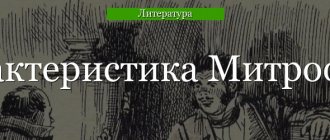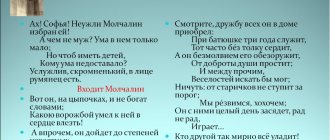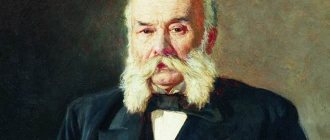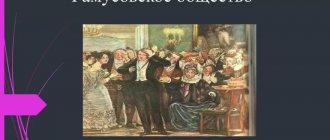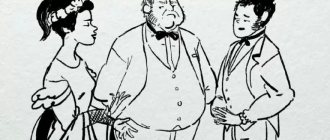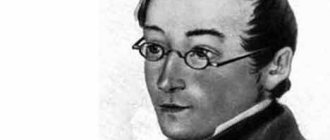In Fonvizin's comedy "The Minor" there are many illustrative characters. Despite the diversity of characters, the play is led by two heroes - the undersized Mitrofan and his complete opposite Sophia.
Sophia is the only positive female character, which suggests that it is in her that the image of the ideal female upbringing that Fonvizin imagined is contained. In comparison with Mitrofan, Sophia’s qualities clearly stand out: thirst for knowledge, good manners, respect for elders, kindness, and modesty. These are the qualities, according to the author, that a well-behaved girl should have.
Sophia's fate brought her a lot of misfortunes. She grew up without a father, and as she grew up, she lost her mother. Since there was no news from her uncle Starodum, who was in Siberia, for a long time, she came under the care of the Prostakovs. The Prostakov family, led by the eccentric Mrs. Prostakova, gave Sophia a very difficult life. They forcibly stopped her communication with Milon, a young man for whom Sophia had sincere and mutual feelings. She was constantly watched, reproached with a piece of bread and restricted in everything. But despite such treatment, Sophia never complained and always treated the Prostakovs with respect.
Sophia is also characterized by fidelity. Despite the fact that she had not seen her chosen one for six months and had not received news from him, she did not change her feelings. All this time she continued to love him. When it turned out that Starodum was not only alive, but had also earned a large fortune in the North, of which he made Sonya the heir, everyone began to fuss around. They tried to force her to marry both Skotinin and Mitrofan, but she was not going to give up her feelings.
Sophia more than once plays the role of a very educated girl. Her speech is very respectful and competent, and she prefers to spend her free time reading instructive literature. Having met his niece for the first time in a long time, Starodum was pleased with both her upbringing and her disposition. He notes with pleasure that Sophia grew up exactly the way he wanted her to be, and even chose the chosen one whom he himself found for her.
Sophia is opposed to both Mitrofan and Mrs. Prostakova. She is the standard of female virtue, an example for noblewomen of that era. In it, Fonvizin included all the virtues that he considered important and key for girls.
Hero behavior
There are few positive characters in Fonvizin's comedy, but they all play significant roles. This includes Pravdin, a government official who came to the Prostakov estate in order to monitor the behavior of the owners and their attitude towards their subordinates. He hid his position and the purpose of his visit.
Pravdin values human rights and believes that no one should humiliate serfs; he cannot justify tyranny and cruelty. The official fulfills his task with unprecedented zeal, and he manages to expose the Prostakovs of atrocities.
The author gave all his characters speaking surnames . Pravdin was no exception. Its meaning lies in its fair and honest character. The official acts according to his principles and does not deviate from the intended goal. Dedication and patience define Pravdin’s views.
His appearance and manner of speech reveal a well-mannered and generous man. Pravdin's main character traits:
- honesty;
- respectful attitude towards the elderly;
- sincerity;
- loyalty to friends;
- courtesy.
The ideological official is presented by the author as an example for all civil servants. Fonvizin said that there are many more people like Pravdin. And as long as they honestly fulfill their duties, the state remains safe.
The employee seeks to convict evil landowners of cruelty and punish them. And this will improve the life of serfs and the well-being of the entire country.
In the comedy, the official is an opponent of the landowners who prefer to lie and flatter for personal gain. Pravdin tries to fight injustice and ignorance. The image of this character is the ideal of an educated and humane civil servant. He skillfully punishes the guilty and deservedly rewards the suffering. Fonvizin considers the official to be the personification of truth, humanity, and honesty.
Attitudes towards wealth and status
Starodum’s aphorisms from “The Minor” remain relevant in the modern world. The thing is that they are universal. The hero says that cash is not cash worth, and a golden fool is still a fool.
The hero sadly notes that wealth is most important for society. Money is the measure of success. This is especially true among couples who want to get married. Few people really think about love; questions about nobility and material well-being are increasingly raised. As a result, such a marriage is unhappy.
You can find many interesting thoughts in the hero’s remarks. He assures that a real rich man does not hide money in a chest, but generously shares it with them . If a person always follows the conventional wisdom, he will forever remain a beggar. It’s a completely different matter when he goes to nature and lives by its rules.
The hero also did not strive to accumulate wealth. Moreover, he refused to serve. In his opinion, for the sake of rank one would have to flatter and weave intrigues, but this is disgusting to him . The character considers his action to be correct, because he has preserved his soul, honor, and rules. This is exactly what he tried to teach Sophia.
It was not for nothing that Fonvizin gave the character a telling surname. At first glance, it may seem that old thoughts are a reference to forgotten beliefs, but if you think about it, everything is different.
The wisdom of centuries reflects the accumulated experience of generations; it will always be eternal. For this reason, Fonvizin’s comedy remains relevant in the modern world.
Quotes from Starodum allow you not only to better understand the characteristics of the character, but also to get acquainted with the author’s position. With the help of this hero, Fonvizin told his point of view.
Characteristics
The law-abiding official ended up in the Prostakov village, where he began to monitor the behavior of the owners of the estate. Pravdin is not indifferent to the fate of the peasants, so he immediately noticed the tyranny and cruelty of the silent Prostakov and his malevolent wife. Quote from the work: “I found the landowner a fool, and his wife a despicable fury, whose hellish disposition brings misfortune to their entire house.”
The official set himself the goal of legally stopping the cruelty of the owners of the estate and taking away the estate from them along with the serfs. He informed his superiors about the village's problems, hoping that the authorities would take appropriate action.
Pravdin characterized the Prostakov family based on their behavior:
- spineless stupid husband;
- two-faced, arrogant and rude wife;
- spoiled and lazy ignorant son.
In comparison with them, the orphan Sophia stands out for her calm disposition and modesty . It is Pravdin who warns Starodum - her uncle - about the bad attitude towards his niece. The hosts received the guest kindly, kissed his hands, and behaved hypocritically. Prostakova tried to prove to Starodum that her son was educated and hardworking. But Mitrofanushka did not know anything that was taught to him.
He told ridiculous essays instead of correct answers. The mother tried to justify her son by saying that education was not held in high esteem in their family.
In the love conflict that happened between Milon, Sophia and Mitrofan, Pravdin does not take much part. But the whole situation turned into a battle for the hand of a rich heiress, whose biography remained a secret for the Prostakovs until Starodum’s arrival. His story about the property that the girl received prompted the mistress of the estate to marry her son to her. This helped Pravdin see Prostakova’s true face, notice her greed and hypocrisy.
History of creation
The idea for the comedy “The Minor” was born to Denis Fonvizin in the winter of 1778, when the writer returned to Russia from France. Abroad, Fonvizin became acquainted with the local legislative system, philosophy, studied the social life of France and appreciated local theatrical productions. The writer used all the experience he gained to work on the play.
Denis Fonvizin
Fonvizin worked on the text for three years and in 1782 tried to stage the play in St. Petersburg. Here the writer is refused, and Fonvizin, together with the actor Ivan Dmitrevsky, who later played the role of Starodum, goes to Moscow to try to get permission to stage the production there. In Moscow, however, the play is again blocked by censorship. Fonvizin needed a few more months to “punch through” the production of the play. The premiere took place on the stage of the Free Russian Theater in St. Petersburg. The image of Skotinin in the premiere performance was embodied by actor Sergei Rakhmanov.
Image in comedy
With the help of Pravdin’s exceptionally positive role in the comedy “The Minor,” the author makes it clear that there are still honest and fair officials left. A civil servant despises everything that is not done according to the law. He does not change his position in any situation; he tries to calm down the masters who mock their serfs.
Pravdin is a highly moral and principled person. He declared a protest against the cruelty of the Prostakovs and decided to punish them for their stupidity and ignorance. Although the official is not a member of the landowner family, he decides their future fate. He took the land from the owners, but agreed to pay all debts for them. Although Prostakova gave him a bribe and was indignant at the “unfairness” of the sentence, Pravdin did not succumb to her persuasion and carried out his decision.
By describing the character of an official, Fonvizin shows the reader the ideal of a public and government worker. Pravdin cares about the future of his country, not forgetting about the common people - the serfs. He fights with all his might for the truth, rejecting barbarism, lack of education, cruelty and bribery.
The reader learns about the honesty of the official from the first pages of the comedy: “I never read letters without the permission of those to whom they are written” (quoted passage). He discovered cruelty and mercilessness towards the orphan Sophia, and called the Prostakovs greedy and envious. Together with Starodum, he put the estate in order and helped the lovers find happiness.
Several interesting essays
- What do the heroes of the comedy The Inspector General dream about, essay 8th grade
Dreams, dreams, what is your joy? And everyone has their own. Gogol, with his characteristic accuracy and precision, describes the dreams of different people in the written comedy. - The image and characteristics of Gloomy-Burcheev in the History of a City, essay
This mayor of the city of Foolov is one of the most unsympathetic among the rulers of a fictional settlement. Drawing their images, Saltykov-Shchedrin expressed his attitude towards the Russian elite and the history of the country. - The image and characteristics of Anna Andreevna in Gogol's comedy The Inspector General, essay
In Nikolai Vasilyevich Gogol's comedy “The Inspector General,” Anna Andreevna is the wife of the mayor Anton Antonovich Skvoznik-Dmukhanovsky. Anna Andreevna is not a very smart woman and she doesn’t care how the audit goes - Characteristics of Assol from the work Scarlet Sails, grade 6
The main character of Alexander Green's story is the dreamy and sincere girl Assol. This girl is one of the most romantic characters in Russian literature of the 20th century.
Lermontov, having written this tweet, seems to be copying it to himself. There is a lot to learn from this product, and at the same time, it is even more fruity and succulent. Lermontov took certain moments from his life that confirm certain elements from the novel
Sophia is the central character of the play, around whom the main events of the play revolve: an unexpected inheritance, the appearance of the girl’s uncle, a kidnapping plan and three suitors fighting each other.
The heroine is well educated, she is left without parents early on and ends up in the house of the Prostakovs, who are trying to take possession of her small inheritance. Knowing that Sophia has a fiancé, Milon, Prostakova is trying to marry her off to her brother Skotinin in order to finally get her hands on the girl’s fortune.
When the landowner finds out that Sophia is a rich heiress, she decides to marry her to Mitrofan. Previously, without ceremony in treating the orphan, Prostakova is now kind and courteous. Realizing that her plans are not destined to come true, the landowner plots the kidnapping of the heroine and forced marriage. However, Starodum, Milon and Pravdin manage to prevent this treachery.
The moral values of the heroine
Sophia in Greek means wisdom. The girl has wisdom of mind and sensitivity of heart. At the end of the play, she forgives Prostakova and rushes to her aid.
Despite the attacks of Prostakova and Skotinin, Sophia remains faithful to her fiancé. At the same time, she is ready to submit to her uncle’s will when he says that he has a suitable party in mind for her. The fact is that she trusts her uncle unlimitedly, asks for his advice and rules to follow.
Sophia talks a lot about life values. For her, conscience and heart are inextricably linked - the peace of one directly depends on the contentment of the other, and for this it is necessary to strictly observe the rules of virtue. She wants to receive respect from those whom she respects, and strives to prevent bad thoughts about herself. Also important to her is the concept of earning your fortune honestly and the belief that being born into a noble family does not make a person noble.
The author's ideal woman
In the image of Sophia, modest and well-mannered, D.I. Fonvizin outlined his feminine ideal. The main principle of family life for her is Starodum’s words and instructions that the head of the family should be a husband who obeys reason, and the wife must obey him in everything. Only then will the family be strong and happy.
Fonvizin strives to make the image of Sofia alive and moving. This is reflected in the heroine’s sophisticated language; she is no stranger to jokes and even manipulation of people - she can easily make her lover jealous.
Sophia and other heroes
Sophia, raised by Starodum, is directly opposed to Mitrofanushka, who was greatly influenced by Prostakova. Sophia's intelligence is inversely proportional to the stupidity of the undergrowth. The girl relies on her uncle for everything, is grateful to him for the advice he shared with her, and Mitrofan renounces his mother at the most difficult moment of her life. The heroine is kind and values the honesty and decency of those around her, but Mitrofan is cruel, only power and wealth attract his attention.
Sophia is also opposed to Prostakova. The landowner believes that a woman should not learn to read and write, that marriage for her is only a means to achieve a goal and her own well-being. She doesn’t care about her husband, she even beats him. And for Sophia, marriage is a union of loving hearts, based on respect and mutual understanding.
Sophia is the central female character in Denis Ivanovich Fonvizin’s comedy “The Minor.” Sophia's noble origin, education and intelligence are harmoniously combined with spiritual simplicity and virtue. Translated from Greek, the name Sophia means “wisdom,” and this name was not chosen for the heroine by chance. However, the heroine’s wisdom has a different, not entirely familiar character. This is not only the rational wisdom of the mind, this is its highest manifestation and embodiment - the wisdom of the soul and heart. Sophia sincerely believes that a person’s virtue is not measured by his wealth or honors, and happiness, in her opinion, should accrue to a person only for his own efforts. The girl was left an orphan, having lost her mother six months ago, and her father when she was still a baby. Sophia finds herself in the care of the landowner Prostakova, who first intends to marry her to her brother Skotinin, and then, having learned that the girl is becoming a rich heir to the fortune of her uncle Starodum, wants to marry Sophia to her careless and mediocre son Mitrofanushka. But Sophia's heart belongs to officer Milon. And this love characterizes Sophia from the best side. Her feelings do not fade for a minute, she is faithful to Milo. In the comedy “The Minor,” the author, using the example of Sophia, also teaches us gratitude. She treats her guardian Starodum, as well as Pravdin, with warmth and respect. When Starodum, promising Sophia to take her from the Prostakovs’ house to Moscow, tells her that he wants to marry her to “a young man of great merit,” Sophia is amazed and embarrassed. But she is grateful for the permission of Starodum, whom she reveres as her own father, to choose whoever she wants as her husband. “Throughout my entire life, your will will be my law,” she says to Starodum. But he does not try to forcibly subjugate Sophia to his will. In choosing a chosen one, this heroine is guided only by feelings, hears only the voice of her heart and soul. Milon has already been chosen by her, and she remains with him at the end of the play. Throughout the comedy, Sophia finds herself among the positive characters who are trying in every possible way to facilitate her release from Prostakova’s care. She turns out to be generous and able to forgive Prostakova for all the insults, and this quality is inherent only in very strong people. “How can the heart not be content when the conscience is calm! It is impossible not to love the rules of virtue. They are ways to happiness,” she reflects while reading, waiting for her uncle at the beginning of the first scene of the fourth act. Sophia wants to earn “the good opinion of worthy people,” but she would like those people from whom she is moving away not to hold a grudge against her, just as she does not hold a grudge against them. She is sincerely surprised that there are people in the world who dislike someone just because they are virtuous and bright. Sophia believes that a strong person should only take pity on such people. For her, a noble person is one who does good only for himself, if he does not do good deeds for others. “I now vividly feel both the dignity of an honest man and his position,” she says to Starodum. Bright and virtuous Sophia, as the action develops, only becomes more confident in what she feels. Therefore, the reader is not surprised that the fate of the heroine in the comedy “The Minor” still turns out to be happy - she remains with her loved one, with her uncle, to whom she is so attached, among good people and far from the world of the Prostakovs.
Article menu:
“The Minor” is a play in five acts written by Denis Ivanovich Fonvizin. A cult dramatic work of the 18th century and one of the most striking examples of classicism. It was included in the school curriculum, was repeatedly staged on the theater stage, received a screen embodiment, and its lines were disassembled into quotes, which today live independently of the original source, becoming aphorisms of the Russian language.
Relationships with others
A speech description of Pravdin would not be complete without describing the official’s relationship with the Prostakov family. He speaks differently about the residents of the estate and its guests:
- mistress and owner;
- Mitrofanushka;
- Skotinina;
- teachers;
- Sophia;
- Milone;
- Starodum.
He considers the owner to be a real devil: she is a grumpy, domineering, greedy woman. She knows how to communicate with higher ranks, grovels before them, and constantly yells at her serfs and even hits them. Pravdin does not like her behavior, he ridicules it. The owner of the estate appears as a spineless, silent man. Prostakova's brother, Skotinin, behaves according to his last name. He talks only about his farm and pigs. Pravdin scoffs at such ignorance.
The long-awaited son Mitrofan was born into the family, whom everyone spoiled. They tried to teach him various sciences, but he could not remember anything he learned. The sixteen-year-old “minor” took an example from his mother: he mocked his teachers and nanny, and threatened to beat him because they forced him to do his homework. Mitrofan's teachers themselves did not receive proper education, so they could not teach the young man the sciences.
Kuteikin tried to teach Mitrofanushka to read and write, Tsyfirkin - the multiplication table and other arithmetic operations, and Vralman was a teacher of French, geography, history and other sciences. By their last names you can understand that in fact they are bad teachers. But the “minor” and his teachers did not evoke pity from Pravdin.
The official immediately liked Sophia due to her meek disposition and education. The well-read, literate girl briefly told him her story and complained about Prostakova’s contemptuous attitude.
Pravdin called Milon his friend; he was glad of his alliance with Sophia. The official considered Starodum’s aphorisms to be vital, and he respected his principles and education.
Fonvizin wrote his comedy with the aim of ridiculing the old views of provincial landowners. Their greed, illiteracy and derogatory attitude towards serfs had already become a relic of the past. But there were many people like the Prostakovs, and honest officials opposed them.
Essay on the topic Taras Skotinin
Fonvizin’s work “The Minor” tells readers a simple story based on everyday problems and everyday routine. In it, the author reveals the images of many characters, but the focus should be on Taras Skotinin.
Taras Skotinin is one of the main negative characters in the work. He appears before the reader as an extremely unpleasant person who rejects all good and positive emotions. The author showed him as a person who is absolutely not interested in other people, and he does not care at all about their needs or their condition. He is used to treating them as unnecessary things that clog up his life, and he only treats his sister more or less normally. There is also obvious hypocrisy in his character, since in front of people who are in a position higher than him, he communicates normally, without giving himself the luxury of becoming arrogant, or God forbid, somehow offending such a person.
Skotinin can rightfully call himself the most disgusting and unpleasant person in the work. For him, the only living creatures close to him are his pigs, whom he simply adores, and offers conditions for them that are much better than he offers for his serfs or other people. He has the goal of buying up all the pigs in the world in order to monitor, care for and feed them. This manic goal reveals his desire to at least have a good relationship with someone and at least do good for someone, but, despite such kind relations with animals, he does not show a kind attitude towards people.
He is also a stingy person, for whom only his pigs are more important than money, although if he had to choose pigs or money, he would choose money, since he is ready to sell even the most expensive thing in his life. The author positions him as a person whom everyone should hate, or at least feel disgusted by his actions, actions, and beliefs, since he is such an outcast. Another important theme in his image is his ambiguity.
Although Taras Skotinin is an extremely negative and unpleasant character, even he sometimes does not skimp on feelings and human traits, such as compassion and kindness. In this way, the author is trying to emphasize that even no matter what a person looks like on the outside, he still has at least something good inside.
Image of Pravdin
The government official Pravdin, according to D.I. Fonvizin, is the personification of an honest, fair, active representative of the law. Like all the heroes of the work, he is endowed with a “speaking” surname, which allows us to understand his essence. This character values truth above all else and fights for justice, without succumbing to any provocation.
Being one of the positive heroes, Pravdin has qualities that the writer values above all else in people. The official is well educated, well-mannered, he understands the great value of education.
For all his rigor and strength of character, he is a merciful person who finds it hard to see the suffering of other people. Pravdin is engaged in social work only because he sees his recognition in it - to stand guard over justice and alleviate the lot of the unfortunate and disadvantaged.
Check out what else we have:
- for the most rational - Summary of "Undergrowth"
- for the most impatient - A very brief summary of “Minor”
- for the most sociable - The main characters of "The Minor"
- for the busiest - Reading diary "Nedorosl"
- for the coolest ones - Read “The Minor” in full
Conclusion
In the comedy “The Minor,” Pravdin is the ideal image of a civil servant: honest, incorruptible, with high moral principles. Pravdin’s attitude towards his duties, towards people, towards education allows us to conclude that it is precisely such officials who are able to resist the deeply ignorant, greedy and cruel tyrant landowners who are dragging Russia to the very bottom.
The role of the hero is to demonstrate that against rudeness, ignorance and cruelty, there is always a much more powerful force capable of delivering fair justice. Pravdin’s characterization with quotes will allow you to better prepare for a literature lesson and write an essay on a given topic.
The collected material, which includes quotes from the text, allows you to independently characterize the character according to plan, help you compose a detailed written work or write an essay on a given topic.
Biography
Pravdin is a nobleman originally from Moscow, a landowner who owns several villages in the governorship. As a government official, he receives from the governor the task of touring the estates and identifying violations on the part of the landowners, namely cruel behavior towards the serfs.
Once on the spot, Pravdin finds out in just three days who the worst offender is. She turns out to be a cruel and capricious landowner, Mrs. Prostakova, who is accustomed to taking out her difficult character on people subservient to her.
Having collected obvious evidence of Prostakova’s crimes, Pravdin determines her punishment - taking her estate under guardianship. Being an honest and incorruptible representative of the law, Pravdin does not give in to the tearful pleas of Mrs. Prostakova and fulfills his duty to the end. After completing the work, Pravdin invites Mitrofan, Prostakova’s son, to go to Moscow and enter his service, after which he leaves the region.
